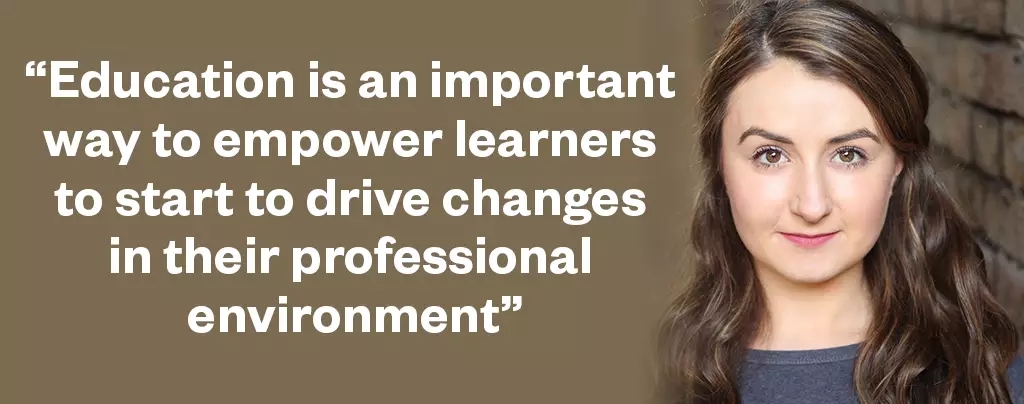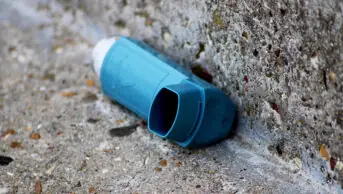
Shutterstock.com
Our planet is unequivocally in climate and ecological crisis, and healthcare is a major contributor.
According to an article published in the Lancet in 2020, healthcare accounts for 1–5% of total global environmental impacts and more than 5% of national environmental impacts in some countries[1]. In England, medicines account for a staggering 25% of NHS emissions[2].
As a future pharmacist, at the start of my foundation training, I am learning every day about the impacts of pharmacy on the environment — mainly, through educating myself on climate science and the impacts on health provision, following national work by the Greener NHS programme and learning from likeminded colleagues sharing their ideas and innovations in their roles.
I will endeavour to work as sustainably as I can: reducing waste or recycling wherever possible, cycling to work and advocating for the most sustainable practice within my hospital trust, such as the prescribing of more environmentally friendly inhalers.
However, there is only so much an individual can do. What is needed is systemic change and it is needed quickly. I am concerned that our profession is not ready for the change that this demands.
You only have to read Tracy Lyons’s recent piece published in The Pharmaceutical Journal to realise that we have a long way to go as a profession if we are to even start tackling this crisis.
Add it to the curriculum
The first step is to have an educated, informed workforce capable of taking a leadership role in ensuring the manufacture, supply and prescribing of medicines is as sustainable as possible. But we are failing to provide this to our young pharmacists.
The MPharm degree contains no mandated teaching on sustainability or climate change[3,4]. This is despite greenhouse gas emissions contributing to more than 25% of global deaths from heart attacks, strokes, lung cancer and chronic respiratory disease — not to mention air pollution, which causes 7 million deaths per year[5]. Climate change also increases infectious disease prevalence, extreme weather events and malnutrition[5]. Although the teaching and clinical content on the MPharm degree that I undertook was brilliant, there was little mention of the effect of climate change on planetary health. This is because the standards set by the General Pharmaceutical Council (GPhC) shape the MPharm degree; therefore, to allow sustainability to be truly engrained in the curriculum, these must be adapted.
The UK is not immune to the threat posed by climate change, with health and social inequalities significant in increasing the vulnerability of many to its impacts on health[6]. The health service in England has an ambitious goal to reach net zero by 2040 and an 80% reduction in carbon emissions by 2028–2032; pharmacists will be important in achieving these goals[7].
It is therefore puzzling why the climate crisis has not been made more prominent in pharmacy education — particularly as the MPharm degree is currently undergoing a restructure, with, in the next few years, plans for all new pharmacists to qualify as prescribers.
The desire for such teaching in medicine is becoming more apparent: in February 2021, the Association for Medical Education in Europe laid out a consensus statement to “provide a global, collaborative, representative and inclusive vision for educating an interprofessional healthcare workforce that can deliver sustainable healthcare and promote planetary health”[8]. In addition, in August 2021, medical students in the UK expressed their need for climate change teaching in all medical schools[9]. This momentum for change must be joined by pharmacy schools.

In 2007, a one-year course on climate change was provided to students on various courses at San José State University, California, and the impact was assessed a minimum of five years later. The findings showed that the graduates reduced their individual carbon emissions by 2.86 tons of CO2 on average per year and the majority reported pro-environmental choices surrounding purchases such as cars and food, as well as describing a strong connection to climate change solutions both personally and professionally[10]. Furthermore, they compared the effect of their climate change education as a mitigation strategy on student carbon reductions against the carbon reductions of other mitigation strategies, such as rooftop solar panels, afforestation, offshore wind power and electric cars. On this basis, at scale, climate change education can potentially be as effective at reducing carbon emissions as other mitigation strategies[10].
The teaching on the MPharm degree shapes the values and drives the behaviours of our future pharmacists. Education is therefore an important way to increase awareness and empathy for the impacts of climate change, and to empower learners to start to drive changes in their professional environment.
Providing such teaching for our future pharmacists, therefore, can have far-reaching implications, both professionally in industry, primary and secondary care but also for patients in the community; for example, by introducing sustainability as part of the holistic approach to patient health.
Emphasise its importance
Current pharmacy training standards are determined by the GPhC, including person-centred care, empathy, confidence and capability as a prescriber and member of a multidisciplinary team in meeting all patient needs and ensuring patient safety[4].
I would argue that sustainable pharmacy practice should be emphasised to the same degree as standards such as person-centred care or using professional judgement as, ultimately, climate change will increasingly pose one of the greatest threats to patient safety.
There is undeniably already a huge amount of content in the MPharm degree; however, including teaching on sustainability does not have to increase the workload or require removal of vital teaching. An infusion/integrative approach to teaching on climate and sustainability, such as the Climate Change Curriculum Infusion Project developed by Icahn School of Medicine at Mount Sinai, New York and a similar approach adopted by the University of Southampton School of Medicine, could be considered[11–13]. This means that climate change is integrated as a common theme within many aspects of healthcare; for example, teaching the projected rise of infectious diseases in the UK as temperatures rise, rather than teaching it as a standalone topic.
When teaching about medicines optimisation, surely students should also have the environmental benefits of reduced medicines wastage explained, rather than just focusing on the cost to the NHS or tablet burden? Similarly, the health economics involved in more sustainable inhaler prescribing is an important area for discussion. While dry powder inhalers are more expensive, they should be placed in the context of having a lower environmental impact than metered dose inhalers, meaning that they reduce pollution, which exacerbates asthma.
Furthermore, such teaching on climate change could be included by providing extracurricular talks from experts in this field, or by offering research opportunities for pharmacy undergraduate dissertations, as has been done by Alison Astles at the University of Huddersfield. Evidence suggests that the most successful educational interventions focus on local, tangible and actionable aspects that can be addressed by individual behaviour, so analysing prescribing patterns or undertaking medication reviews are very attainable examples for considering the environment[14].
Equally, appreciation of some of the healthcare drivers of climate change and subsequent impacts on global health must also be considered to update the MPharm degree content. Namely, exploration of the different intersections of climate, health and environment, health inequalities, NHS carbon emissions and net zero health care. Additionally, understanding the impact of medication on drinking water, nature and ecosystems can tie in with exploration and understanding of ‘benign by design’ pharmaceuticals (drugs designed with biodegradability and reduction/elimination of hazardous substance generation at their forefront) and sustainable packaging innovations. In line with the holistic approach to patient care, learning about the impact of climate anxiety on mental health and an awareness of plant-based diets are topical clinical considerations.
Of course, there is another option. This could be a tenth GPhC standard for pharmacy professionals along the lines of ‘to work sustainably in line with enhancing planetary health’. This would not only mean that sustainability could be inextricably linked to all teaching provided on the course and allow for that content to be examinable, but would also apply to other members of the pharmacy team, who are vital to improving the sustainability of pharmacy practice, and would also bring the whole profession along with this drive for change.
Climate change is defined by the World Health Organization as the greatest health threat of the 21st century, pervading all aspects of life, and so it must be addressed as a matter of preserving life and upholding patient safety[15]. Therefore, to continue to neglect it as part of the teaching on healthcare is not acting in the best interests of our patients.
We need all pharmacy professionals to possess knowledge on climate change and the tools to practice sustainably; the culture of which can be ignited in undergraduate education and carried through to foundation training and beyond. If the climate crisis equals a health crisis, then there is no time to waste.
- 1Lenzen M, Malik A, Li M, et al. The environmental footprint of health care: a global assessment. The Lancet Planetary Health 2020;4:e271–9. doi:10.1016/s2542-5196(20)30121-2
- 2Delivering a net zero NHS: areas of focus. NHS. 2020.https://www.england.nhs.uk/greenernhs/a-net-zero-nhs/areas-of-focus/ (accessed Sep 2021).
- 3Future pharmacists: standards for the initial education and training of pharmacists. General Pharmaceutical Council. 2011.https://www.pharmacyregulation.org/sites/default/files/document/gphc_future_pharmacists_may_2011.pdf (accessed Sep 2021).
- 4Standards for the initial education and training of pharmacists. General Pharmaceutical Council. 2021.https://www.pharmacyregulation.org/sites/default/files/document/standards-for-the-initial-education-and-training-of-pharmacists-january-2021_0.pdf (accessed Sep 2021).
- 5Urgent health challenges for the next decade. World Health Organization. 2020.https://www.who.int/news-room/photo-story/photo-story-detail/urgent-health-challenges-for-the-next-decade (accessed Sep 2021).
- 6Paavola J. Health impacts of climate change and health and social inequalities in the UK. Environ Health 2017;16. doi:10.1186/s12940-017-0328-z
- 7Delivering a net zero NHS. NHS. 2020.https://www.england.nhs.uk/greenernhs/a-net-zero-nhs/ (accessed Sep 2021).
- 8Shaw E, Walpole S, McLean M, et al. AMEE Consensus Statement: Planetary health and education for sustainable healthcare. Medical Teacher 2021;43:272–86. doi:10.1080/0142159x.2020.1860207
- 9Grover N. UK medical schools must teach about climate crisis, say students. The Guardian. 2021.https://www.theguardian.com/environment/2021/aug/17/uk-medical-schools-must-teach-about-climate-change-say-students?CMP=twt_a-environment_b-gdneco (accessed Sep 2021).
- 10Cordero EC, Centeno D, Todd AM. The role of climate change education on individual lifetime carbon emissions. PLoS ONE 2020;15:e0206266. doi:10.1371/journal.pone.0206266
- 11Tun MS (SanYuMay. Fulfilling a new obligation: Teaching and learning of sustainable healthcare in the medical education curriculum. Medical Teacher 2019;41:1168–77. doi:10.1080/0142159x.2019.1623870
- 12Medical Schools Are Pushed to Train Doctors for Climate Change; Movement backed by American Medical Association starts to grow, though content can be hard to fit into an already-packed curriculum. Wall Street Journal. 2019.https://www.wsj.com/articles/medical-schools-are-pushed-to-train-doctors-for-climate-change-11565170205 (accessed Sep 2021).
- 13Bevan J, Roderick P. Infusing climate change and sustainability into the medical school curriculum. UK Health Alliance on Climate Change. 2021.http://www.ukhealthalliance.org/infusing-climate-change-and-sustainability-into-the-medical-school-curriculum/ (accessed Sep 2021).
- 14Anderson A. Climate Change Education for Mitigation and Adaptation. Journal of Education for Sustainable Development 2012;6:191–206. doi:10.1177/0973408212475199
- 15WHO calls for urgent action to protect health from climate change – Sign the call. World Health Organization. 2015.https://www.who.int/news/item/06-10-2015-who-calls-for-urgent-action-to-protect-health-from-climate-change-sign-the-call (accessed Sep 2021).


